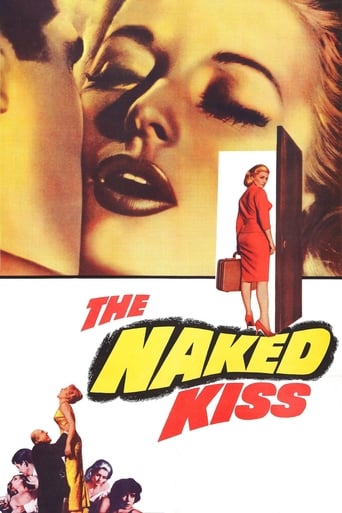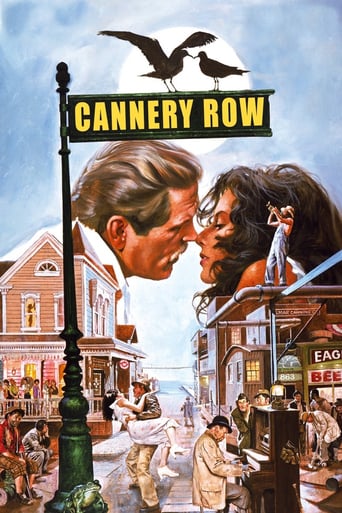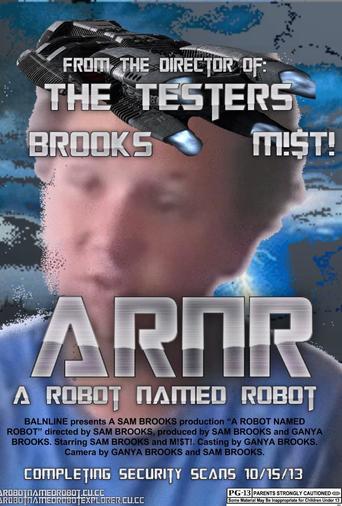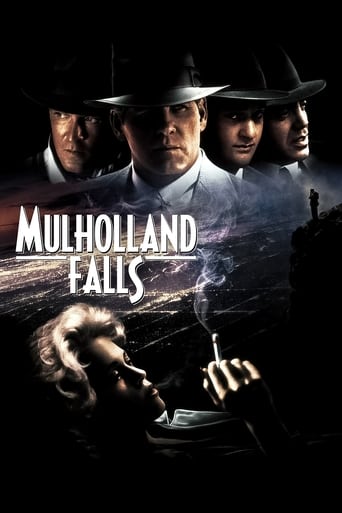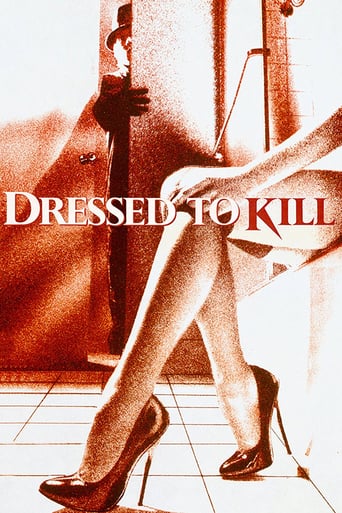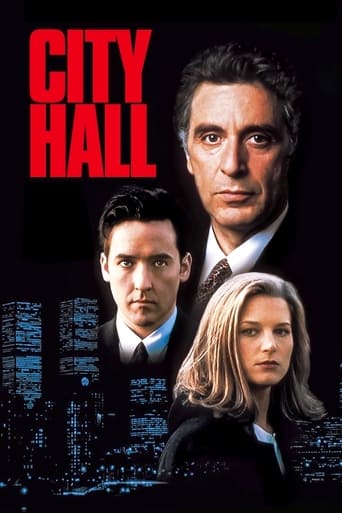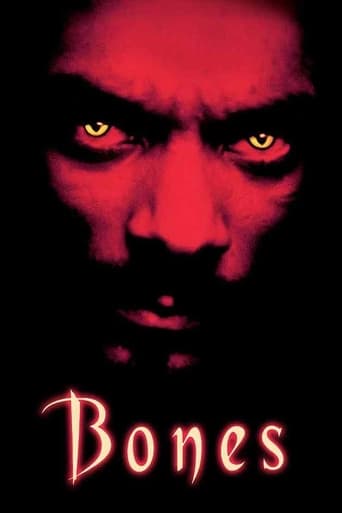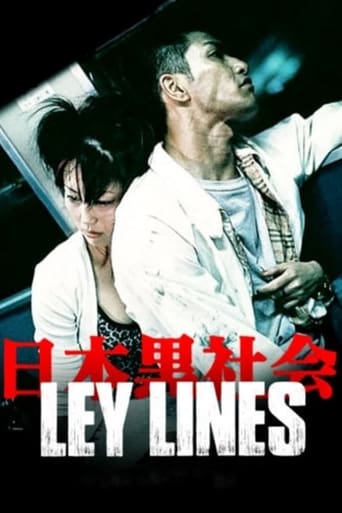
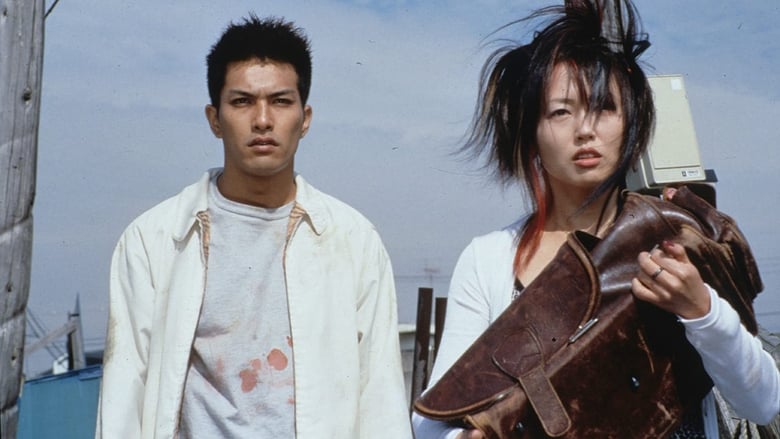
Ley Lines (1999)
The story follows a trio of Japanese youths of Chinese descent who escape their semi-rural upbringing and relocate to Shinjuku, Tokyo, where they befriend a troubled Shanghai prostitute and fall foul of a local crime syndicate. Like many of Miike's works, the film examines the underbelly of respectable Japanese society and the problems of assimilation faced by non-ethnically Japanese people in Japan.
Watch Trailer
Cast


Similar titles
Reviews
LEY LINES is the third and final part of an unconnected gangster trilogy by Takashi Miike, following on from SHINJUKU TRIAD SOCIETY and RAINY DOG. Once again the focus is on a youthful group of Chinese Triads, this time living in Japan and struggling to make ends meet. The film begins on a light and comic tone as the men mess around and have fun, but then they get involved with a criminal element and things turn deadly. I found this film to be pretty slow and unfocused, if I'm honest, lacking in the kind of basic characterisation that would make the lives of the characters we're watching interesting. Miike can't resist throwing in some perverse and explicit sexual elements but they add nothing to the overall quality of what is a largely lacklustre film.
Ley Lines is the third and last instalment in Takashi Miike's Black Society Trilogy that focuses on foreign gangsters with inner struggles trying to find a purpose in life. Ley Lines both shares similarities and differences with Shinjuku Triad Society and Rainy Dog. Despite overall positive critics, I think this movie is the weakest part of the trilogy even though it's still slightly above average.Just as the first film, Ley Lines focuses on Chinese-born Japanese that have to face a lot of prejudice and racism which is made clear right from the start in a beautiful and surreal opening sequence. Just like in the second movie, the main characters team up with a prostitute that is also looking for a purpose in life. The main characters clash with local gangsters that also have a foreign background which is also typical for the trilogy.On the other side, Ley Lines focuses on three characters instead of a lone wolf. It tells the story of two brothers and their school friend who leave the countryside on a train and hope to become rich, famous and accepted in Tokyo. Upon arriving, they get tricked and robbed by a prostitute but she gets beaten up by her pimp and crosses the path with the trio again and decides to accompany and help them this time. The trio first sells petroleum-based inhalant toulene for a weird local low-level criminal. When they realize that they are still living like outcasts, they plan on moving illegally to Brazil on a cargo ship. In order to finance such a resettlement, they rob a local gangster clan that chases them down until the final showdown at the port. Ley Lines has a few brutal and explicit scenes like the other two movies, for example when the prostitute gets beaten up by her pimp and when she has to serve two weird clients which are events that convince her to change her profession, life and identity. On the other side, the film has some situation comedy as well. The brothers' friend is weird, overenthusiastic and eccentric which adds a lot of humour and pace to the film but also feels somewhat exaggerated and redundant at times. The prostitute is also quite quirky and has sexual intercourse with all members of the trio to cheer them up which is portrayed in a surprisingly neutral way as this doesn't provoke any conflicts between the four characters. The film is overall less brutal and intense than the first movie and less melancholic and solitary than the second instalment. It's somewhere in between those two films and feels directionless at times when weird situation comedy and uplifting moments are followed by rather depressing or boring sequences. Despite a few solid ideas like showing the constant shift of ups and downs in the lives of the three outsiders, Ley Lines is somehow missing its own distinctive identity and has a few minor lengths.In conclusion, Ley Lines is still a slightly above average movie and if you have watched Shinjuku Triad Society and Rainy Dog, you won't regret watching this third and last part of the Black Society Trilogy either. If you haven't watched the other two films, there are numerous other Japanese gangster movies of much better quality you should watch first. Let me suggest you Another Lonely Hit-man, Gozu and Outrage.
It's strange: while I would probably much rather watch one of the more insane and, by virtue of reputation, more popular works repeatedly from Takashi Miike like Ichi the Killer or Visitor Q, a film like Ley Lines or Graveyard of Honor are probably technically better made "films", and is a wonderful but harsh reminder of how dedicated an artist Miike can be with the right material. Ley Lines is dark and depressing and about alienation and filmed often with a detached and unflinching eye on the plight of its young Chinese outsiders. It's also at times, not too unusually for Miike, strange and random and violent and with bits of deranged sex (here, as in other Japanese films, blurred out amusingly with blue lightning). I knew watching it I should've found some of the choices Miike made almost too detached or too pretentious or too stark with its depiction of some kind of reality. But by the end, I didn't care, in a sense.That sense really has to do with connection with the bulk of the director's stylistic choices and the characters who with only a little development appear fully realized (or at least sympathetic as the lost and tortured souls of this story). It's about three Chinese guys who leave their blasé suburban lives and go to Tokyo, where they're soon robbed blind by a prostitute. Ironically, and in what is at first irony and then becomes a minor tragedy, the prostitute's Chinese currency doesn't fare at all with her nasty pimp and her other call duties are ugly at best and revolting (or just plain twisted underground crap) at worst, and she ends up back with them by an odd twist of fate. The Chinese youths go through some unsuccessful motions, like selling an ether-esquire drug, before one decides that it's time to leave this dreadful Tokyo landscape: Brazil. A heist is plotted, and executed, but with (somewhat) typical fatalistic results.Miike seems to be experimenting, but at times in subtle gestures with the camera and lighting that suggest perhaps his own questioning of himself and his skills as opposed to just what the script requires. It's an exhilarating mix-and-match; early on we get that rushing bravura of the variety where we get put into the rush and vibrancy of youth with the camera tracking unevenly along as they ride bikes or gliding in a long take across the train station into the train car. Then, in Tokyo, sometimes a shot will just last a while on something and Miike won't cut if something violent or action-like is happening right in the next room (in these instances the cut-away to a close-up, or the emphasis on leaving a spot, becomes paramount). And last by not least Miike tries a red filter in the bulk of the frame, adding some crazy but always interesting effect to scenes like the one kid running through the streets to get back to his friend whom somehow he knows is beat up, or in the scenes towards the end (not to mention that very random but affecting moments with that man in the underground room requesting stories from Shanghai girls- very specifically those girls- and a fish somehow makes its way into the inter-cutting of a story).On top of this, Miike's actors, most of whom I've never seen much of before with only one (Shoi Aikawa) I can recognize immediately, are all top shelf talents seemingly without doing much most of the time. It's after the heist, of course, that their chops are tested even more, and it's hard not to get caught up emotionally or feel frazzled as the one kid goes on about childhood memories and his mother in the back of the car. Somehow against all of the possible pit-falls of being ironically showy with his attempts at depicting these alienated people and the dregs of society (the real criminals here are go-for-broke evil people, including an oddball African) Miike makes the themes and ideas stand out excellently. In the 'art-film' sensibility, in fact, his compositions are incredible, and his control of fluctuating mood matches that of something out of the French new-wave, comparisons to Bande a part not-withstanding.So, in short, don't watch it if you're expecting a Dead-or-Alive or a Gozu. This is serious film-making about tragic and lost souls, with only some (chilling) slices of the wild-man Japanese director we all know and love in some circles.
Three young delinquents strive to do something with their respective lives, hopping on a train to Tokyo. Dan Li from XX: Beautiful Beast plays a hooker who tricks the young naive men getting away with their many. Karma's a bitch though and her pimp beats her up for having too much money. After a run-in with a truly sadistic john, she runs into the threesome yet again, but she's more susceptible to go along with their various plans. This film, the third and last in Takashi Miike's thematically linked 'Black Society trilogy' combines the feel of the first two. And though I find it head and shoulders above "Shinjuku Triad Society", I don't feel that it was quite strong as "Black Rain", due to the story seeming to be all over the place.My Grade: B- DVD Extras: An EXTREMELY informative Commentary by Tom Mes (the guy really knows his stuff); 2 interviews with Takashi Miike; Yasushi Shimamura interview; Artwork; Bio/Filmograhies; and a theatrical Trailer





